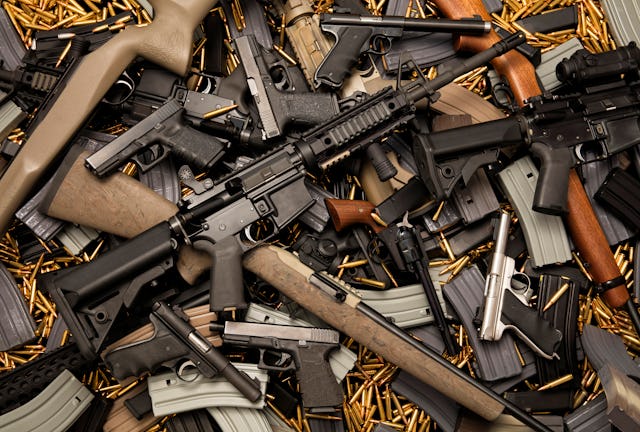States With Stricter Gun Laws Have Lower Gun Death Rates Because Gun Laws Work

“Gun laws don’t work.”
I see this statement over and over every time gun control debates start up (which is often, considering the fact that the United States has a mass shooting almost every day, on average).
Before I make the case that gun laws do appear to work, let’s get Chicago out of the way, since that’s always the first thing anti-gun-legislation folks bring up.
White House press secretary Sarah Huckabee Sanders summed up the Chicago argument perfectly the day after the mass shooting in Las Vegas: “I think if you look to Chicago, where you had over 4,000 victims of gun-related crimes last year, they have the strictest gun laws in the country. That certainly hasn’t helped there.”
First of all, Chicago doesn’t have the strictest gun laws in the nation. It did until 2010, when the firearms ban was lifted by the Supreme Court. In 2012, its concealed carry ban was lifted. If we’re comparing big cities, New York and Los Angeles have stricter gun laws than Chicago (and notably lower gun violence rates).
Second of all, 4,000 victims of gun-related crimes sounds outrageous, and indeed, every victim of any kind of violence is a tragedy. However, Chicago is not even in the top 10 cities for gun violence rates. The numbers sound daunting, but per capita, the gun violence rate there is a third of what it is in the actual gun violence capital of the U.S.: New Orleans (where gun legislation is practically nonexistent).
Third, I’ve lived in the Chicago area. You drive south out of the city, blink a few times, and you’re in Indiana, a state with very few gun regulations. Gun control measures in a city that borders a state with lax gun laws will naturally be rather ineffective. It’s not like there are checkpoints as you drive across the border.
But Chicago is merely a distraction in the gun legislation debate anyway, as it’s a city, not a state or country covering a large geographical area.
People say that comparing other countries to the U.S. doesn’t work due to differing cultures and constitutions. Thankfully, we have internal sovereignty within states right here in the U.S., so we have 50 examples of how gun legislation covering broad geographic areas plays out in our own country.
It’s not even fuzzy. The data from our 50 states point to a clear correlation between strict gun legislation and lower gun violence rates.
Here are the top 10 states with the strictest gun laws and their gun death ranking:
Of the states with the tightest gun regulations, 7 out of 10 are in the bottom 10 for gun death rates, and 9 of them are in the bottom 20.
And here are the 10 states with the least restrictive gun laws:
Of the states with the least restrictive gun laws, 4 out of 10 are in the top 10 for highest gun deaths, and 8 of them are in the top 20.
There are always outliers like Maryland, Vermont, and Kansas, of course, but overall the numbers are pretty straightforward.
But the numbers are not what I found most interesting about these statistics. It’s the states themselves that I found surprising.
Most of us tend to think of big cities when we think of gun violence: gangs, higher violent crime in general, etc. But look at the numbers for the states with our biggest cities:
New York — home to America’s largest city? Third lowest gun death rate in the country.
California — home not only to Los Angeles, but also San Francisco, San Diego, other urban areas? Seventh lowest.
Massachusetts has Boston. New Jersey is basically one big urban sprawl. It’s not like these are simply safer, small town states.
Even Illinois, with Chicago’s “horrible” gun violence, barely misses the lowest 10 for gun death rates overall. Could Illinois’ gun laws have anything to do with that?
Now, the statistical folks out there will remind us that correlation does not equal causation, and they’d be right. But in all seriousness, how do you explain these numbers?
Could it be that gun legislation actually does work when applied across a wide geographical area? If you can come up with a better explanation, please share it.
So how about those mass shootings? “No laws can prevent mass shootings,” people say. “Criminals will still get guns illegally.” Maybe. Maybe not. Naturally, with the number of guns in America, we can’t prevent every gun death.
But mass shootings are really only one piece of our country’s gun violence puzzle. No other developed nation even comes close to our rate of deaths by firearm. Not. Even. Close. That means there’s either something wrong with us as a people, or there’s something wrong with the way we handle guns.
I don’t believe Americans are any more evil or are more inherently prone to wanting to kill others or themselves than people in other nations. The only things we clearly differ on are the obscene number of guns in our country and the comparatively minuscule amount of regulation on those guns.
Other countries manage to have freedom-loving democracies and still have reasonable gun control measures. There’s no reason we can’t follow suit.
Really, it comes down to a simple question: If states with stricter gun laws tend to have lower gun death rates, isn’t it worth implementing similar laws federally? Aren’t 33,000 lives per year worth trying something that appears to be working?